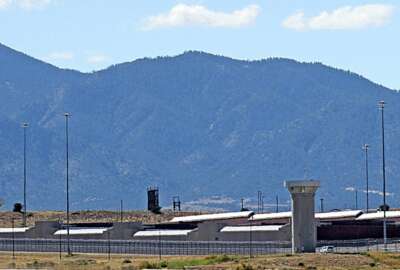
How the Bureau of Prisons looks if you’re a local union president who also does the job
Federal Drive host Tom Temin talks with Aaron McGlothin, President of AFGE Council 33, a local chapter, representing officers at the Federal Correctional...
Follow the rest of Federal News Network’s series, The Worst Place to Work in the Federal Government.
The Federal Drive with Tom Temin continues its week-long series: The Worst Place to Work in the Federal Government, which happens to be the Bureau of Prisons, part of the Justice Department. Yesterday we heard from a former warden, Bob Hood. In today’s installment, Federal Drive host Tom Temin talks with Aaron McGlothin, President of a local chapter of AFGE Council 33, representing officers at the Federal Correctional Institution at Mendota, California.
Interview Transcript:
Tom Temin And you are a corrections officer, but you also do some time as a union rep also?
Aaron McGlothin Yes, I’m a correctional worker and also the local union president. So I split my time up between both jobs.
Tom Temin All right. Let’s talk about life inside Mendota. What type of institution is it? With respect to security and what’s the population like inside there?
Aaron McGlothin Mendota is a medium security facility. Our population is pretty much bursting at the seams like most other facilities. It has its challenges on a daily basis as to what we deal with in regards to the population since all of these private prisons have shut down nationwide. We’ve received an abundance of these inmates who are coming back into the system from the private sector, and it does definitely make life a challenge.
Tom Temin Is there something that happened in the private sector that makes them maybe harder to manage or more disobedient or I don’t know what the words are, but is that a phenomenon?
Aaron McGlothin Well, the big thing is, is that there’s a difference between the Bureau of Prisons and these private facilities. The private facilities are a for-profit institution. So they try to pack as many inmates as possible so they can receive that money, the programing, the meals, the medical care, the things of that nature. And also the way these inmates are supervised is a far cry from the way we do it in the Bureau of Prisons. So these inmates are used to a different type of atmosphere, being able to get away with quite a bit more at these private facilities versus coming to the Bureau of Prisons, that’s kind of a shock.
Tom Temin And so that must have, I’m imagining, a safety effect.
Aaron McGlothin It absolutely does. And that kind of goes into the process that we utilize or the agency utilizes called augmentation. They’re reassigning non- correctional officers to work correctional positions. So now you are taking away from your first responders when it comes to emergency responses. So there’s less staff that can assist in emergency situation.
Tom Temin And what is daily life like for a corrections officer? I mean, do you feel like you’re in danger every moment you are on the shift or is it come and go? Or I mean, what kinds of encounters do you experience routinely with the inmates?
Aaron McGlothin Every time we walk into that grill and we walk into the secure confines of the facility we have to be on guard at all times, because typically our correctional officers there’s one officer working in a housing unit with 120, 130 violent offenders. We always have to be on our A-game and be cognizant and vigilant of our surroundings. I always say that no two days are the same in regards to the the work.
Tom Temin And do you like the work? Do you feel motivated by it? I mean, what is your motivation for being a corrections officer?
Aaron McGlothin My motivation is I always try to make a place better than when I found it and I thoroughly enjoy it. I’ve worked at four separate facilities in my agency career. I started at United States Penitentiary Atwater, I went to FCC Beaumont in Beaumont, Texas, FCI Dublin, and then I’ve been at Mendota now almost ten years. I enjoy the job. I enjoy my coworkers. I just don’t enjoy what the agency has been lacking in giving the staff what they need.
Tom Temin And that gets to the heart of the matter because the agency did get the lowest score in the Best Places to Work, making it for purposes of this series, the worst place to work in the federal government. What do you need, do you feel, from headquarters, from regional leadership? What do you not getting, do you feel and what effect does that have on the job itself?
Aaron McGlothin I think the biggest thing that we’re lacking is support from up above. We received a new director last year in August, and while she was moonlighting for staff wellness and all these coming in, making all these changes that benefit our hard working staff, none of that’s come to fruition. Now, she’s basically putting everything out on the inmate population, creating inmate work groups, offering all these different incentives and benefits to the inmate population. But yet the hard working staff, we put our lives on the line every day dealing with these offenders at all levels of facilities, and the only thing that we’re getting is mandatory overtime, bogus discipline cases for the most minor infractions and not getting much support from management overall. And you’re seeing that at the local level because they’re promoting all of these individuals to management positions that don’t belong. They don’t have the experience. Quite a few of them are incompetent and it leads to just unsafe working conditions and it leads to just a bad work environment altogether.
Tom Temin We’re speaking with Aaron McGlothin. He is president of Local 1237 of the American Federation of Government Employees. And it seems like the staffing levels, a lot of issues come around to that, because you said people that are not actually correctional officers get assigned to that type of duty. It could be a secretary or a nurse, we’ve heard. And they’re on the floor there doing correctional officer work. I guess my question is staffing would be number one for you?
Aaron McGlothin Staffing is number one. I think the key thing is, is that the agency, they’re not really putting an all-out effort to properly fill our facilities with the staff that we need. In the end if they try to save on overtime by reassigning other staff like you had mentioned, nurses, teachers, plumbers, those types of individuals, but you’re also taken away from the overall response if something happens. You’re lowering the response time if there’s an emergency, whether it’s a staff assault, inmate medical emergency, whatever the case may be you’re basically creating a unsafe work environment. And I feel the agency isn’t really trying its best effort to properly staff our facilities, because the statistics show that every year our staffing levels go down. But what’s interesting is our elected officials continue to give the agency appropriations to fund over 20,000 officers in the agency every year, but we only have about 13,000. So there’s tens of millions of dollars that nobody knows where it’s going. And the agency is pretty tight lipped about that money.
Tom Temin And let’s talk about the communications that you mentioned earlier from headquarters. You said that there’s programs that are coming down to help the inmates. Let me play devil’s advocate. Shouldn’t programs of work and so forth, and anti-recidivism types of things that the inmates can participate in, shouldn’t that translate to an easier job on the officers?
Aaron McGlothin I 100% absolutely agree with you on that. However, you have to have those staff in place to teach those classes. But if they’re being reassigned as a correctional officer, there’s nobody there to teach those classes.
Tom Temin Got it. And the interaction with the inmates, aside from when something bad happens for a correctional officer, can there also be good interactions and where you actually maybe help with the correction part of someone that can make a successful transition back out to the regular world?
Aaron McGlothin Yes. Not every interaction with the inmates are a negative one. We’re in charge of the care in the custody of these individuals to ensure that we can lower recidivism and that they reintegrate back into society to be productive once again. So even as correctional officers we have that effect because we deal with these individuals on a daily basis. However, there’s an old saying that idle hands are the devil’s tools. Our prisons are full of convicted felons. So inmates like to have a daily schedule. And when you disrupt that schedule because there’s teachers or VT instructors or different individuals that teach these programs, if they’re not available to occupy these inmates time, you’re basically essentially putting them in a situation to engage in less than proper activities.
Tom Temin Right. I guess one of the issues is that just to make up a number, if three quarters of the inmates are really interested in bettering themselves and getting out and becoming productive once again, it’s the 25% that are the trouble that may be beyond redemption, but yet everyone’s all together in the same house.
Aaron McGlothin That is correct. And that’s the thing is there’s there’s a lot of things that can happen on a daily basis. And I think a lot of people that are out there don’t realize, especially in the the union world, because not everybody’s actually at the facility on a daily basis. We have people that have not been at the facility in many years. So it’s kind of hard to get the wrap around what’s going on at the facility if you’re not there. People like myself I’m here every day, so I’ve got eyes on if there’s an emergency, if there’s an assault, if somebody has to go to a hospital, I’m eyes-on every day and hands on and boots on the ground. And we’re seeing a large uptick in incidents. We’re seeing a lot of instance, whether it be assaults, medical emergencies because at the end of the day, when these private prisons closed, they just flooded the Bureau of Prisons with all these new inmates. And we didn’t have the staff. So it’s hurting us at the local level. Our facility is we’re bursting at the seams with inmates, and half of the population came from private prisons. So they’re having to readjust as well these these inmates from the private facility. So it’s definitely a challenge.
Tom Temin Just to bring this around, then, what would make the Bureau of Prisons a better place to work from your standpoint?
Aaron McGlothin I think it starts with the leadership. I think proper training, proper promotion. We’ve always seen I call it the good old boy system, to where it’s not what you know, it’s who you know. I’ve been doing this since 2001. I’ve seen in my career that when somebody screws up royally, instead of holding them accountable from management side, they promote them. So we’ve seen so many different members of management get promoted based on bad behavior. That’s actually something I’m dealing with at my local facility. I’ve got some really bad managers here and they just keep getting promoted and there’s no accountability. I’ve had to go to Congress. I’ve had to go to the Office of Special Counsel, the Inspector General, Internal Affairs, and I’ve recently got an appointment to have our local congressman come take a tour of the facility, because I want him to put eyes on exactly what’s happening here.
Tom Temin Interesting. And just a final question, too. I guess that was the penultimate question. The earlier one. As we speak, a former warden has already spent his first few nights in federal prison because of his abuse of prisoners. I mean, that happens also among corrections officers and other staff. Do you feel that the agency does a good job or sufficient job of policing against that? A small percentage that spoil it for the other employees.
Aaron McGlothin I’ll say this. This is something that I’m very adamant about. I’m very adamant about the fact that there is not the same accountability for management as there is with line staff. As a local union president, I spend a good deal of my time going into the investigative side to represent staff for violations of the standards of employee conduct. When management violates the statutes of misconduct. It’s a double standard. Actually, that warden that is doing time, I worked for him at a facility many years ago, and you saw the arrogance and the pompous behavior that probably put him in that situation because there’s a lot of corrupt managers. And what I mean by that is I’m not saying criminally corrupt. But the fact is, is they don’t hold each other accountable. They give them free passes. And I’ve seen it firsthand at my facility from the safety manager to supervisory lieutenants to associate wardens. I mean, I’ve seen so much corruption and zero accountability because when something comes to light, the agency from up above would rather just promote them and move them somewhere else, make it somebody else’s problem. So we’re seeing this incompetence and corruption within the agency. And instead of holding these people accountable, they just move them around and make it somebody else’s problem.
Follow the rest of Federal News Network’s series, The Worst Place to Work in the Federal Government.
Copyright © 2025 Federal News Network. All rights reserved. This website is not intended for users located within the European Economic Area.
Tom Temin is host of the Federal Drive and has been providing insight on federal technology and management issues for more than 30 years.
Follow @tteminWFED
Related Stories





